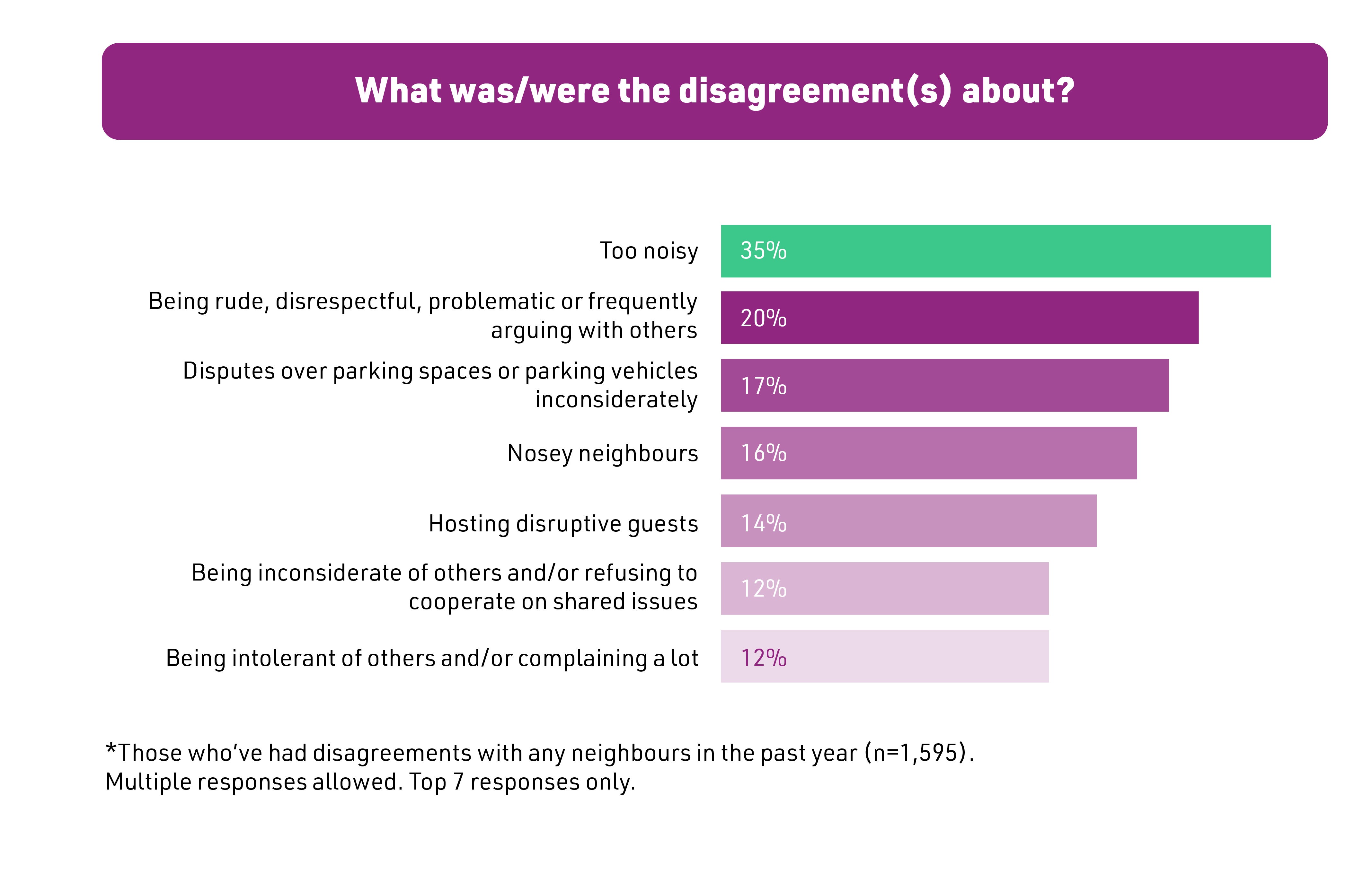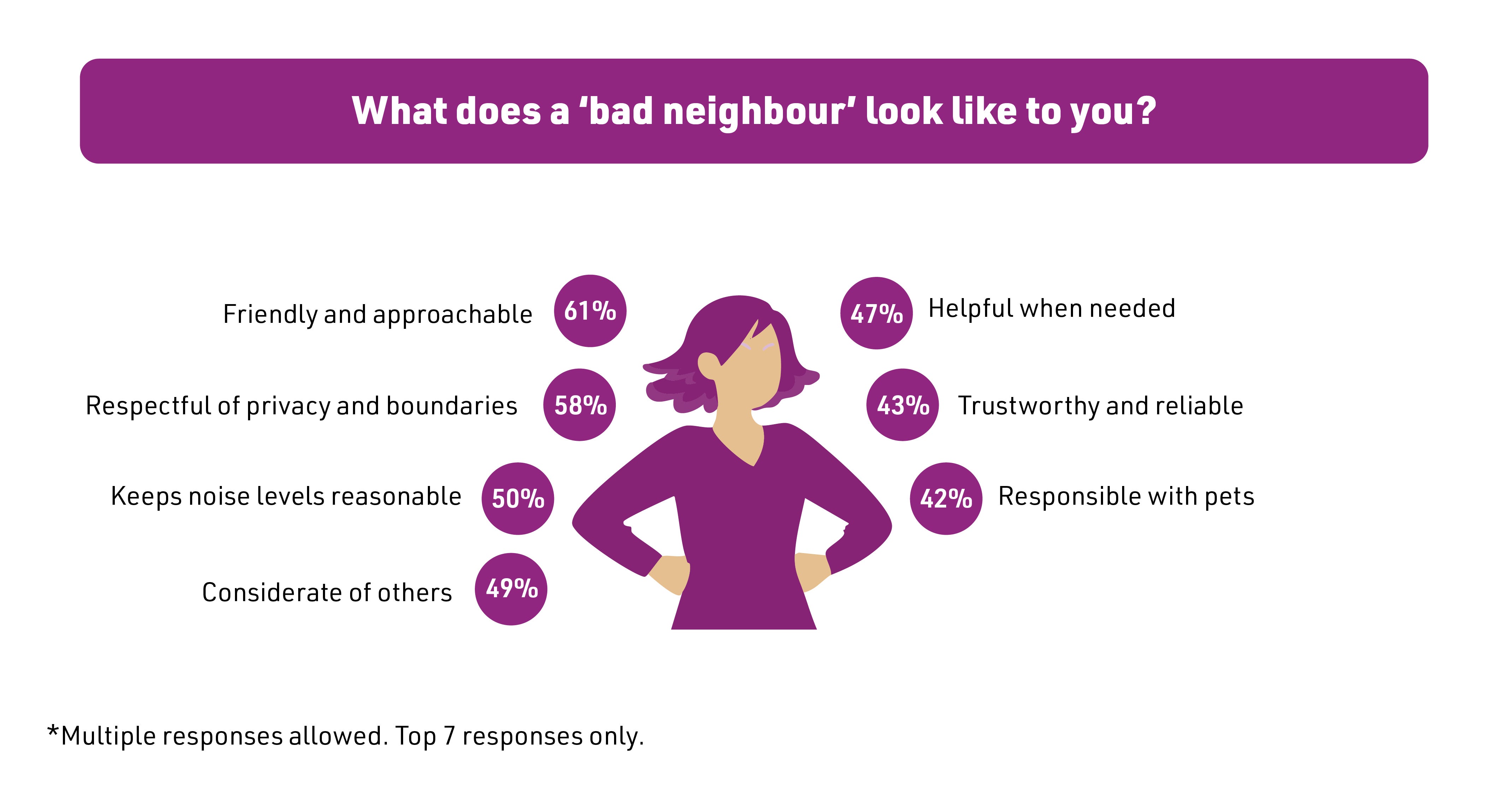Should you move house over a bad neighbour?

Moving house because of a bad neighbour is not a decision to make lightly, and usually isn’t a viable option for many. However, neighbourly disputes can be more common than we may think.
While many disputes can be addressed with collaborative, open communication, more serious issues (such as unsafe or illegal behaviour) may not be resolved through conversations alone. By trying a range of conflict resolution steps first, you can figure out the most appropriate action to take when dealing with a particularly difficult neighbour.
In this guide, discover the most common types of neighbourly disputes across Australia, practical steps that may resolve neighbour disputes and how to know when it could be time to move out.
How do Australians feel about their neighbours?
Unfortunately, Australia’s iconic community spirit seems to be fading. The latest data from the Real Neighbours Report 2025 reveals that neighbourly tensions are rising, and many Australians are hesitant to form new relationships with their neighbours, too.
Here’s a snapshot of how Aussies feel about their neighbours:
- More than 1 in 4 (26%) have received passive-aggressive messages from neighbours, rising to around 1 in 3 (34%) among Gen Z
- More than 4 in 5 (81%) would be deterred from buying or renting a property if 'bad neighbours’ were present
- Almost a third (32%) have taken steps to escape difficult neighbours, with 1 in 5 (20%) considering a move and more than 1 in 10 (12%) actually relocating

Common neighbourly disputes
When it comes to disputes with neighbours, common themes also appear in the research from Real Insurance.
Alarmingly, close to 1 in 3 (32%) of respondents have experienced at least one conflict in the past year, with noise levels as well as rude or disrespectful behaviour noted as two of the top reasons for conflict among neighbours.

Some of the most common disputes that crop up between neighbours in Australia include:
- Noise complaints: The Real Neighbours Report 2025 reveals that ‘keeping noise levels reasonable’ is a clear sign of a good neighbour among 58% of respondents. On the flip side, excessive noise was the most common pet peeve respondents have about their neighbours, with nearly 4 in 10 (38%) citing it as a top issue.
- Parking and driveway disputes: Similarly, disputes over parking spaces or parking vehicles inconsiderately were identified as a top trait used to describe a bad neighbour for 15% of respondents. Plus, parking disputes ranked as one of the top three causes of neighbourly disagreements (17%).
- Nosey neighbours: The same research found that 50% of respondents believe being ‘overly nosey’ is a sign of a bad neighbour. Some of the top concerns expressed include neighbours watching/observing them without consent (39%), spreading rumours or gossip (23%), and asking intrusive or overly personal questions (23%).
- Complaints about dogs and pets: The Real Neighbours Report 2025 reveals that 47% of respondents say having ‘aggressive pets that pose a threat’ is a top sign of a bad neighbour. Plus, 27% of pet owners have felt judged by neighbours due to the pets they own or how they care for their pets.
What are the signs of a bad neighbour?
While every neighbourhood and local community is unique, there are some common traits of bad neighbours to look out for.
According to the Real Neighbours Report, the top three signs of bad neighbourly behaviour include:
- Being rude, disrespectful, problematic, or frequently arguing (61%)
- Being too noisy (58%)
- Being too nosey or not respecting privacy (50%)

How to resolve neighbour disputes
With conflict between neighbours becoming increasingly common, it’s helpful to know what steps you can take to address and resolve neighbourly disputes. Before you consider the idea of packing up and moving out, try these practical conflict resolution tips to see if it’s possible to mend the relationship with your neighbours.
1. Document incidents
While we hope you won’t need it, having a clear record of interactions and issues with your neighbours can prove helpful if you ever need to escalate the issue down the track.
Consider keeping an up-to-date log of when incidents have occurred, what was communicated, and any interactions with third-party services or local authorities, as this can make it easier if police investigations or even court proceedings occur in the future.
2. Communicate with your neighbours
According to Relationships Australia, the most common approach to resolving conflict with neighbours is to talk to the person (37%). Generally speaking, the earlier you bring up small issues or concerns, the better placed you’ll be to prevent small irritations from becoming heated, tense arguments with your neighbours.
Try to come into these conversations with an open mind, lead with curiosity, and deliver your feedback in a calm, respectful tone. Being collaborative, kind, and willing to compromise may put you in the best position to find a resolution.
3. Explore mediation or other conflict resolution services
If open dialogue and in-person conversations aren’t working out as planned, it might be worth exploring free mediation services available in your local area.
For example, in NSW, you can take neighbourly issues to a Community Justice Centre mediation service in a safe, neutral space. The goal of these sessions is to enable a professional mediator to work with you and your neighbours to find an amicable resolution — without resorting to expensive legal action, in the first instance.
4. Contact authorities
If the safety of your home, your loved ones or yourself is at risk, it’s important to take action and speak with the relevant authority to escalate the issue.
- From violent conduct to concerns about dealing illicit substances, consider lodging a report with the police in the case of illegal activity in your neighbourhood.
- For unsightly waste dumping or poorly maintained properties that can pose a risk to public health and safety, consider contacting your local council.
- For neighbourhood disputes that haven’t been resolved through mediation, consider speaking with a lawyer to assess whether bringing a proceeding before the local court is the right move in your scenario.
What to consider before you think of moving out
Still on the fence? If you’re navigating an ongoing conflict with a neighbour, it can be helpful to assess the severity of the issue and understand the reasons that might indicate if it’s time to consider moving out.
Use the guide below to help you assess what action could be helpful in your scenario. Plus, make sure to seek professional advice before taking action to ensure you make the right decision for your personal circumstances.
| Questions to ask yourself | Action to consider |
| Is this neighbourly dispute having a significant or ongoing negative impact on your wellbeing? | You want to feel safe and comfortable in your own home. If you’re changing your daily routine to avoid a bad neighbour or are experiencing severe mental or emotional distress on a regular basis, it may be time to consider trying to improve the situation. |
| Is your neighbour displaying unsafe or illegal behaviour? | If contacting the police and local law enforcement authorities hasn’t resolved the issue, it may be in your best interests to consider moving to safeguard the health and wellbeing of yourself and your loved ones. |
| Have you tried other ways to resolve the issue, such as open communication and mediation? | If past attempts to resolve the issue haven’t proved successful, it may be worth exploring whether legal action is the right move for you by speaking with a lawyer. |
| Is this dispute a minor inconvenience or a major stress impacting your daily life? | Moving out can be an expensive and time-consuming process, and not a financial option for everyone. While open communication should be able to resolve minor inconveniences, more serious conflicts may be harder to resolve — and can have a greater toll on you and your family’s health, happiness and wellbeing. |
| Is there potential for this situation to improve or resolve itself in the future? | If your neighbourly issues and disagreements have a clear timeline for resolution, patience may be a good option to prevent you from needing to spend the time, energy and money on moving house. |
| Are you in a position to pay for the costs of relocation? Are you able to handle the emotional toll of moving house? | Create a budget and see whether your household income can support the costs of moving house, including the costs of removalists, rental bonds and other transition costs. Plus. consider the emotional toll of moving house, such as helping your kids adjust to a new school, commuting to your job from a new location and finding a new support system in a different city, suburb or neighbourhood. |
Keep Reading: Thinking about making a change? Discover the top four things you should consider before relocating for work or lifestyle reasons.
Frequently asked bad neighbour questions
Can a bad neighbour impact your home’s resale value?
If your home is located next to a bad neighbour with a poorly maintained home and unkempt garden, with clear evidence of hoarding or disrepair, this may have a negative impact on your home’s resale value.
Reports from Realestate.com.au indicate that visible signs of bad neighbourly behaviour may lower the potential sale price of a home, with real estate experts anecdotally sharing that this could devalue homes by up to 5%.
What should I do if my neighbour retaliates after I make a complaint?
When it comes to neighbourly disputes, escalating the issue to your local council or police department is a common approach if you’re unable to resolve the issue through open conversations alone. If your neighbour retaliates after an issue has been flagged, it’s worth seeking independent legal advice to understand your rights and how to handle the dispute moving forward.
Keep reading
Want to learn more about Australia’s friendliest suburbs?
Head to the Real Home Insurance Spotlight to read more helpful home, neighbourhood and community guides.
9 Oct 2025